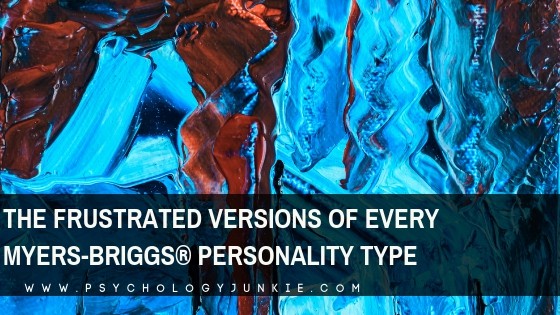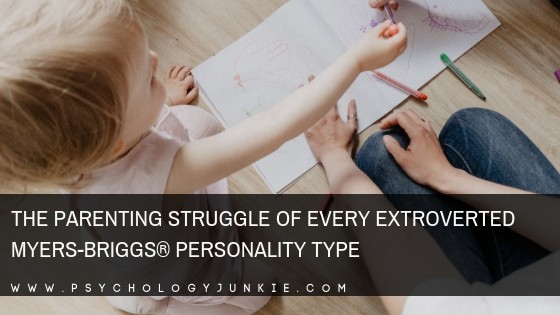The Frustrated Versions of Every Myers-Briggs® Personality Type
Updated July 28th, 2021
What are you like when you’re not encouraged to be your best self? What are you like when your gifts aren’t appreciated and you feel forced into an uncomfortable “box?” Today we’re going to look at the frustrated, unappreciated versions of each Myers-Briggs® personality type. These are the individuals who feel like they can’t be themselves, who feel unsure of their place in life, who feel overburdened and misunderstood.

Not sure what your personality type is? Take our new personality questionnaire!
Table of contents
- The Frustrated Versions of Every Myers-Briggs® Personality Type
- The Frustrated ENFP
- The Frustrated ENTP
- The Frustrated INFP
- The Frustrated INTP
- The Frustrated ENFJ
- The Frustrated ENTJ
- The Frustrated INFJ
- The Frustrated INTJ
- The Frustrated ESFP
- The Frustrated ESTP
- The Frustrated ISFP
- The Frustrated ISTP
- The Frustrated ESFJ
- The Frustrated ESTJ
- The Frustrated ISFJ
- The Frustrated ISTJ
Estimated reading time: 16 minutes
The Frustrated Versions of Every Myers-Briggs® Personality Type
The Frustrated ENFP
ENFPs who aren’t appreciated for their gifts often feel scattered, distracted, and troubled. When their natural thirst for ideas and possibility isn’t quenched, or when people try to micro-manage or control them, they have more difficulty than usual focusing. They tend to be more uncertain about their insights, and making decisions becomes extremely stressful for them. Without the ability to trust themselves, they may accept other’s perceptions too quickly or, in reverse, become non-conformist and rebellious as a way of escape. When stressed, ENFPs can either double-down on deadlines and to-do lists or they can lose sight of deadlines and procedures, leaving projects unfinished and responsibilities unmet.
If an ENFP’s intuition isn’t encouraged or developed, they may fail to take in enough information to make wise decisions. They won’t trust their insights and can flounder in uncertainty and insecurity.
If an ENFP’s feeling process isn’t encouraged, they can go from idea to idea, never focusing their energy on actualizing their perceptions or epiphanies. They can also make overly-hasty decisions that don’t line up with their core beliefs and ethics.
Read This Next: What ENFPs Do When They Get Really Stressed Out
The Frustrated ENTP
ENTPs who can’t find a place where they belong tend to fight against the structures caving in around them. They tend to be more brash, abrasive, and critical. Rather than enthusiastically sharing their ideas and working with others towards growth and possibility they become rebellious and combative, searching for a place to call their own. They are typically more scattered than usual and have more difficulty focusing.
If an ENTP’s intuition isn’t encouraged or developed, they may struggle to take in enough relevant information before making a decision. If they are pressured to use sensing more than intuition they tend to be stressed, nitpicky, and more anxious than usual. They will struggle to trust their insights and can feel depressed and stifled.
If an ENTP’s thinking process isn’t encouraged or developed, they may flit from idea to idea without taking the time to bring those ideas to fruition. If they are forced to rely on feeling more than thinking then they can become overly concerned with what others want or need and lose sight of their own strong sense of accuracy and logic. They may also become emotionally manipulative as a way to get what they want or to add some excitement to their lives.
Read This Next: How the ENTP Reacts to Stress (Infographic)
The Frustrated INFP
When INFPs feel misunderstood, pressured, or frustrated they tend to have more difficulty than usual expressing their feelings and thoughts. Verbal communication becomes tricky and they feel lost as they try to put words to their overwhelming emotions. They often express their feelings through writing better during these times, but vocalizing their feelings is difficult. They often withdraw from others and retreat from situations or outside obligations. It can be difficult for them to express their values or needs, so people around them may be uncertain about how to provide support.
If an INFP’s feeling function isn’t developed, they tend to struggle with making the best decisions. They may go from one idea or possibility to the next but fail to understand which decision best lines up with their authentic self. If they are forced to rely on thinking more than feeling then they tend to become stressed, critical, and obsessed with productivity. They feel a restless need to get things done, but often this productivity feels highly stressful and agitating.
If an INFP’s intuitive process isn’t encouraged or developed then they may struggle with taking in enough information before making a judgment. They may fail to notice outer realities and make decisions based solely on their personal values. If they are forced to rely on sensing more than intuition then they can become more stuck in their routine, anxious about trying new things, or judgmental of views that lie outside of their own experience.
Read This Next: What Each of the 16 Personality Types Loves About INFPs
The Frustrated INTP
When INTPs are unappreciated, misunderstood, or unable to use their gifts they tend to become cynical and negative. They often isolate themselves, feeling stifled and judged by the outside world. In this state, they are typically more argumentative, sarcastic, and critical of others and themselves. If forced to be around people who don’t understand them, INTPs tend to feel mentally blocked and inhibited. They may start to anticipate their own failure and become pessimistic, believing that it’s no use to try to explain themselves because they’ll inevitably be misunderstood.
When an INTP’s thinking processes aren’t encouraged or developed they tend to move from idea to idea without stopping to critically analyze them. They may fail to see how one piece of data connects to another and can struggle to make decisions that are in their best interest. If they are forced to use feeling much more than thinking then they can become self-conscious, stressed, and uncharacteristically emotional.
If an INTP’s natural way of intuiting isn’t encouraged or developed, then they can struggle to take in reliable information. They may become exceedingly isolated and stuck inside their own heads, sorting out data without testing in it the outside world. They can struggle to actualize or discuss their ideas or way of thinking. If they are forced to use sensing more than intuition then they can become stuck in a rut, overly-reliant on routines, or suspicious of change.
Read This Next: 3 Weird and Wonderful Secrets About the INTP
The Frustrated ENFJ
If life circumstances haven’t supported ENFJs in their natural development or gifts then they tend to become overwhelmed and stressed. They may become inundated by anxiety and worry, feeling guilty about things they shouldn’t or doubting themselves and their abilities. In order to feel some sense of certainty or order, they can become controlling and rigid. Criticism is especially difficult for ENFJs in this stage of life. They tend to feel attacked by criticism and have a hard time separating what’s personal from what is constructive. They may feel especially critical and fault-finding of themselves and others, but they may suppress these feelings because they don’t want to create conflict.
If an ENFJ’s feeling preference is discouraged or undeveloped, they may struggle to make the best decisions for their lives. They may defer to other people to make decisions because they don’t trust their own logic or conclusions. ENFJs who are forced to rely on thinking over feeling often feel anxious, stressed, and obsessed with sorting through data. This ultimately leaves them feeling more indecisive.
If an ENFJ’s intuitive abilities are discouraged or undeveloped they can struggle to see possibilities and may jump to conclusions, making decisions too rapidly. They may become impulsive and hasty rather than seeing the future implications of their current actions.

The Frustrated ENTJ
If ENTJs are overwhelmed, misunderstood, or stifled they tend to become more angry than usual. This shows up initially through an increase in criticism and directiveness. In an effort to gain a sense of control or order they try to take control of the situation to change it. They can also lash out at the people they feel are forcing them into a set of expectations that don’t work for them. They may feel plagued by self-doubt and resentment, feeling lonely and trapped because their natural gifts aren’t being used. It can be difficult for them to express their frustration and pain to others, and as a result, they may have difficulty finding coping resources. They often take out their anger and stress in a surge of productivity or physical exercise.
If the thinking side of an ENTJ has been discouraged or undeveloped, they may struggle to bring their plans to fruition. They will have great, revolutionary ideas, but knowing how to implement them can be more difficult than usual. If they are forced to rely on feeling more than thinking then they can become especially stressed and withdrawn.
If the intuitive side of the ENTJ isn’t encouraged or developed, they can struggle to consider the alternatives and implications of their decisions. They may be too hasty to jump to a conclusion without reflecting on the underlying meanings, factors, and perspectives that they would typically consider.
Read This Next: 10 Things ENTJs Look for in a Relationship
The Frustrated INFJ
When INFJs are frustrated, stifled, or discouraged in their strengths they tend to become more private and withdrawn. They accumulate conclusions and predictions but will rarely share them with others because they feel that their insights will be ignored or discarded. If this kind of repression continues they will become more isolated, resentful, and critical of the outside world and themselves. They may feel that there is something deficient in their way of thinking and they may try to accumulate massive amounts of data to “prove” their insights.
When an INFJ’s intuition is repressed or discouraged, they tend to form conclusions too quickly without reflecting on the information that led to those conclusions. They will struggle to trust their insights and may instead try to rely on sensing, which over time leads them to a place of stress.
When an INFJ’s feeling function is repressed, they struggle to bring their insights out into the world. Their creativity stays locked inside and they will appear colder and more critical than is typical for an INFJ. It’s important for INFJs to utilize their feeling function in order to bring their ideas to fruition.
Read This Next: 24 Signs That You’re an INFJ
The Frustrated INTJ
If an INTJ doesn’t find a place where they are understood or able to use their gifts, they tend to become more aloof and abrupt than usual. They may isolate themselves from the world and be critical of people who don’t agree with their visions or plans. When they discover a path for their life, they are single-minded to a fault, ignoring relationships and obligations that fall outside of that one goal. They are often plagued by loneliness and a sense of imbalance.
When an INTJ’s intuition is repressed or discouraged, they tend to make poor decisions based on insufficient information. This tends to happen when INTJs are forced to be more extroverted than they actually are. Without sufficient time to channel data through intuition, their actions are less strategic and precise than usual.
When an INTJ’s thinking process is repressed, they tend to struggle to bring their insights into actuality. They may have wondrous ideas and elegant predictions, but expressing those ideas and making things happen will be very difficult for them. They may struggle with loneliness, resentment, and a feeling of being an “outsider.”
Read This Next: 10 Things That Excite the INTJ Personality Type
The Frustrated ESFP
When ESFPs are stifled or discouraged in their abilities, they tend to become more distracted and impulsive than usual. Without encouragement in their strengths or appreciation for what they do well, it can be difficult for them to accept their natural gifts or develop them. They may have trouble accomplishing tasks or meeting deadlines, and they may take things more personally than they were intended.
When an ESFP’s sensing process isn’t encouraged, they tend to become more focused on temporary gratification than practical, wise choices. Typically realistic and resourceful, without the help of strong sensing, ESFPs can become overly focused on the immediate without considering the side-effects of their decisions.
When an ESFP’s feeling side isn’t encouraged, they may get caught up in temporary excitement or action without weighing or evaluating their decisions. They may focus on the experience and the opportunity, but without checking into their moral compass to decide what is right for them on a personal level.
The Frustrated ESTP
If ESTPs are discouraged in their natural abilities they tend to feel frustrated and bored. They may have trouble accepting structure, rules, and deadlines. During these phases, they are often rebellious of authority, rules, or anyone they feel is trapping them. They tend to focus more on temporary enjoyments and pleasures than activities that will provide long-term satisfaction.
When an ESTP’s sensing side isn’t encouraged or strengthened, they tend to become focused on instant gratification. They may pursue physical risks and challenges, but without carefully considering the practicality of their decisions. Typically pragmatic and resourceful, ESTPs without healthy sensing may be too impulsive and quick-to-act.
When an ESTP’s thinking side isn’t encouraged, they tend to struggle with making choices and logical decisions. They may prioritize the needs of others over their own sensible decisions. They may also get stuck “playing a part” rather than being their typical direct, no-nonsense selves.
The Frustrated ISFP
If ISFPs are discouraged in their natural gifts and abilities they tend to withdraw from the world around them, trying to find solace in their own mind. They often feel misunderstood, self-critical, and undervalued. Insecurity plagues them, but deep inside they feel that there is something unjust in the misunderstandings they are dealing with. They may eventually resist structures and rules and take on an anti-authoritarian stance.
When an ISFP’s natural feeling preference is discouraged they tend to get caught up in the details of everyday life. They may react to experiences and events without considering their values and what’s personally significant to them. They may struggle to know themselves fully and feel pressure to rely on getting things done, being efficient, and overly-logical at the expense of their true nature.
When an ISFP’s natural sensing process is discouraged they tend to have difficulty gathering accurate data for decisions. They may be overly subjective in their decisions, losing touch with their typical pragmatic approach. This can result in them being overly sensitive and forming inaccurate conclusions.
Read This Next: In-Depth ISFP Personality Profile
The Frustrated ISTP
ISTPs who are discouraged in their strengths tend to become cynical and negative, withdrawing from the outer world to find comfort in their own minds. When the people around them don’t appreciate their natural gifts, they become more impulsive, rebellious, and distracted than usual. In these phases they often refrain from making commitments, postponing decisions and dreading obligations or anything that might “trap” them.
When an ISTP’s natural thinking process is discouraged, they often get caught up in experiences, opportunities, and impulses, without processing them enough logically. Their decisions tend to be less precise and careful than usual, and they may have more haphazard responses when a crisis erupts.
When an ISTP’s natural sensing process is discouraged they tend to have difficulty gathering enough accurate data for a decision. They may enjoy mulling over thoughts, ideas, and possibilities, but struggle to bring those thoughts into the outside world. They are less pragmatic than is typical for their type, and more apprehensive.
Read This Next: 5 Reasons Why You’ll Need an ISTP During a Zombie Apocalypse
The Frustrated ESFJ
If life circumstances don’t support ESFJs in their natural strengths, they tend to become doubtful of their gifts and abilities. They may focus entirely on meeting the needs of others and being “all things for all people” and fail to appreciate their own authentic nature. Worry and guilt often plague ESFJs in this phase, and they can feel an incessant need to organize and control their environment so that others are happy and things are stable. They are typically very sensitive and may imagine slights or insults where there were none intended.
If an ESFJ’s feeling side is discouraged or repressed they tend to become uncertain and lost. Making decisions becomes very difficult and they may rely on others to form conclusions because they don’t trust their own value system or inner guidance. If they are forced to use thinking more than feeling they tend to be stressed, anxious, and overly critical of themselves and others.
If an ESFJ’s sensing side is discouraged they may jump to conclusions too quickly, not taking enough time to reflect on or analyze the details of a situation. They may become overly controlling and rigid, not seeing relevant facts that would make their decision more sensible.
Read This Next: 7 Things That ESFJs Experience as Children
The Frustrated ESTJ
If ESTJs are discouraged or misunderstood in their natural strengths and abilities they tend to become irritable and rigid. They can be overly intrusive, trying to control the world around them so that they can feel secure or clear-headed. During these phases, they can become authoritative and controlling, and others may see them as “know-it-alls.” As their natural strengths are continually shut down they often feel stressed and alone. It can be difficult for them to voice their feelings and despair and so they may retreat from the world and behave more like an introvert than an extrovert.
If an ESTJ’s natural thinking process is discouraged or undeveloped they can become unrealistic in their evaluations and expectations. They can struggle to be fair, consistent, and logical, focusing more on details and desires than effectiveness.
If an ESTJ’s natural sensing process is discouraged they can make decisions too quickly, jumping to conclusions without taking in enough information. They may skip over important facts and details in their rush to form a conclusion. They can struggle with biases and unfair judgments.
The Frustrated ISFJ
ISFJs who are discouraged in their natural abilities tend to feel unsupported, unappreciated, and isolated. They can become overly-focused on a procedure or creating a corner of the world that they can control. This can result in an over-reliance on routines or fearfulness of change because they feel alone and unable to have the support and security of their loved ones.
Without support or development of their sensing side, ISFJs can rush to make decisions without analyzing all the details and practical realities. They can become overly-sensitive and easily offended, losing their signature level-headed nature.
Without encouragement or development of their feeling side, ISFJs may struggle to deal with the outer world. Decision-making becomes harder, and they may defer to authority or someone they trust rather than trust their own wisdom.
Read This Next: 10 Things You Should Never Say to an ISFJ
The Frustrated ISTJ
When ISTJs are discouraged in their natural abilities, they tend to feel isolated and irritable. During these phases they struggle to include others – they feel that only they are the only ones who can get things done the right way. Without support from others, they withdraw more, becoming stuck in their routine and feeling apprehensive about change or innovation. They often feel over-reliant on schedules, times, and procedures, resenting people who impose on them.
Without support or development of their sensing function, ISTJs can rush to make decisions without considering new information. They may jump to conclusions too quickly and struggle to regain their typical focus and attention to detail.
Without support or encouragement of their thinking side, ISTJs can struggle to bring their ideas to fruition. They can get wrapped up in their memories, their routine, and their inner world and fail to accomplish the goals they really wish to.
Read This Next: What ISTJs Do When They’re Really Stressed Out
What Are Your Thoughts?
Did you enjoy this article? Hate it? Let us know in the comments!
Find out more about your personality type in our eBooks, Discovering You: Unlocking the Power of Personality Type, The INFJ – Understanding the Mystic, and The INFP – Understanding the Dreamer. You can also connect with me via Facebook, Instagram, or Twitter!














Sarcasm 100% when I am frustrated. I also stop explaining what I mean as I get argumentative quickly when they don’t understand or misunderstand. Intp here.
Wow, frustration as a norm can easily lead to mis-typing. This is very interesting.
hello susan!
you are absolutely spot on as usual, bravo! i do so enjoy your reading your insights and look forward to each new one with eager anticipation.
thank you so much ????
i hope you have a truly phenomenal weekend.
karen/INFP
Thank you so much Karen! Your comment is a real encouragement 🙂
I’m an INFJ…. Right on target.
Wow! Thank you for this. I have been raised by a narcissistic father and through that I have never felt secure in who I am nor allowed to act or think in another way besides the ones he offers…
I left home and felt alienated and stupid.. And still struggling. But reading this was a huge eye opener!! I’m an INTP. Thank you so much again!
MBTI is Not valid or reliable. Every major study supports this claim
Then offer the specific sources. Don’t just be those types of people who say “MBTI is bad,” and expect me to take your word for it with emotional opinions.
Hi, I am an ENTP on the borderline to INTP. Imagine Tony Stark never created Iron Man or made great ideas a reality through action. He has creativity & thinking ability but seems no one wants to hear him & he can’t physically manifest his dreams. I feel like he would if this happened quite often. A terrible darkness that follows me until I create something progressive for life.
It’s true about INFJs, however being a male INFJ, I tend to rely on tapping into my “Se” to break out of any rut I may be in. It snaps me out of my inner world and into the present time frame. I believe, since there’s a universal theory that women are more emotional, intuitive, and naturally drawn to networking and connecting, and that men are traditionally more visual, logically, and comfortable in our solitude (the man cave), that as a male INFJ, my cognitive functions goes thru a masculine filter when interacting with the world. So my “Se” (visual) and “Ti” (logically) are more well developed (mature) at a younger age, while I believe female INFJs are better attuned to “Ni” and “Fe”. In other words, as a male INFJ, I put less emphasis on “Fe” and that’s why I lean more on my “Se” and solitude, it’s nice to emotional connect but I can get by wanderlusting ( “Se” ) and solitude by default of my masculinity filter. I’ve noticed a slight bias about how INFJs feel better by networking and emoting, and my INFJ brain keeps thinking it’s TRUE but…
Just want to say of all the MBTI profilers, you are by far my favorite. Your accuracy suits how my INFJ brain works, your intuitive insights have lit up the shadow parts of my mind. I was fortunate to have dated an ENTP woman for 5 years, I think we both grew tremendous, at least I did because she expanded my comfort zone and gave me tons of sigma points. What I mean is, when I read about what you say to ENTPs, your accuracy is uncanny all around. Thank you for helping me understand myself better. You’re #1!
Very accurate. I (INTJ) do have a tendency to use sarcasm to communicate my ideas after others laugh at or ridicule those ideas when I say them in a non-rude way (probably especially after I have had no opportunity to slow down and consider better ways to react to the situation). Maybe a part of me thinks that rudeness is the only language they understand or I have a desire for revenge, or both.
On point as an INFJ.
When I get frustrated, I try to get myself to talk about my frustrations, which often has to do with the fact that people are being unreasonable. I respect that people get stressed from genuine problems in life, whether it’s one big problem, or several small problems mixed together all at once. Though some people just seem to get bothered by the pettiest differences among people, and anything new or untraditional. I have no problem with people living traditional lives, but if they force me to participate, then there’s a problem here. Not so different from what I’m doing on this site in the comments’ section. Though I’m only here, and not elsewhere, because I’m sure a high enough percentage of people will listen in a public place, even if maybe half of people don’t bother.
I understand that the blunt truth isn’t needed all the time, but sometimes feelers seem to want to tell a white lie even if people are genuinely in danger, and they don’t take the risks or consequences happening to them that seriously. I could say “Drinking bleach is not a cure for the coronavirus,” but a lot of people go ahead and endanger themselves, while loved ones enable them to do stuff like that. Seems rather hypocritical to their ideas of helping people sometimes, when they just smile and agree, really. Especially the FJs over the FPs, but FPs will still do this more than they admit.